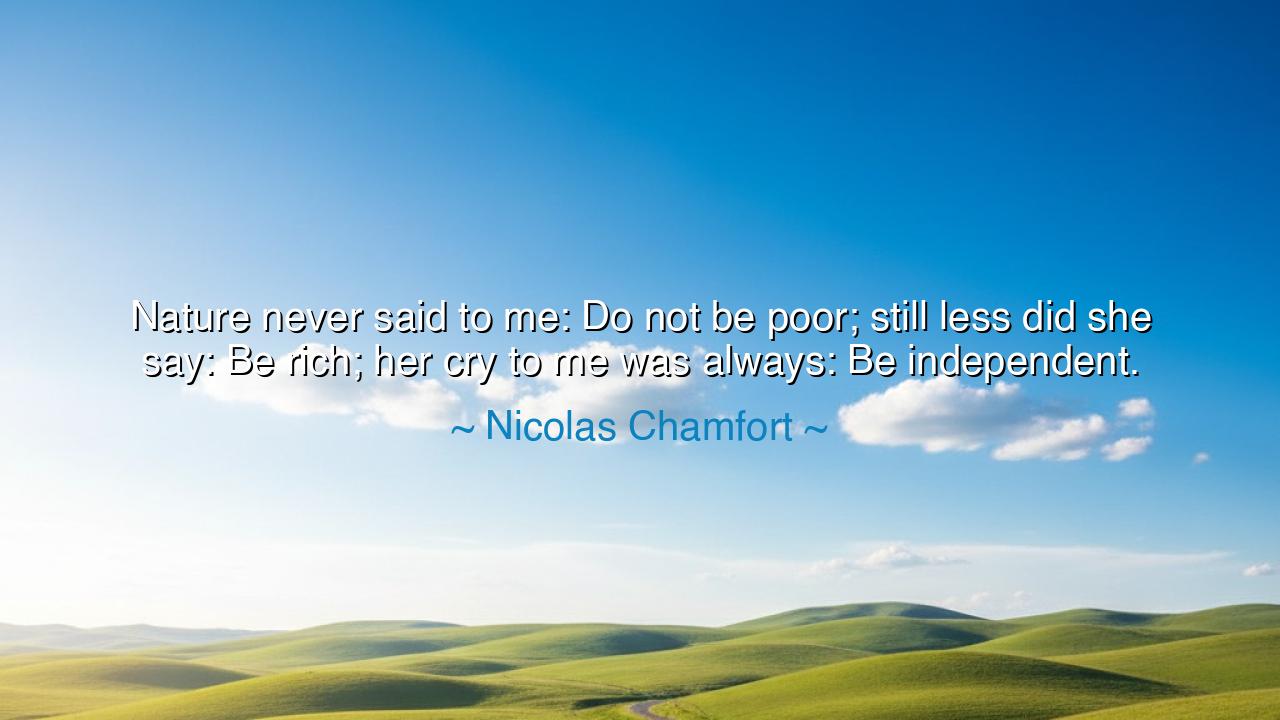
Nature never said to me: Do not be poor; still less did she say:
Nature never said to me: Do not be poor; still less did she say: Be rich; her cry to me was always: Be independent.






Listen, O children of the future, to the wise words of Nicolas Chamfort, a man who understood the deep truths of the human spirit: "Nature never said to me: Do not be poor; still less did she say: Be rich; her cry to me was always: Be independent." These words speak to the very essence of what it means to live a life that is not defined by wealth or poverty, but by freedom and self-determination. In the grand tapestry of existence, it is not riches or poverty that hold the deepest meaning, but the ability to stand alone, to shape your own path, and to live with the dignity that comes from independence.
Nature, O children, is not concerned with the material conditions of our lives. She does not command us to accumulate wealth or to live in destitution. She asks only that we be independent, that we live true to our own nature, with strength, self-reliance, and the freedom to choose our own destiny. Whether we are rich or poor in material wealth, it is the independence of the spirit, the ability to chart our own course, that brings true fulfillment. To be independent is to possess the power to shape your life according to your own values, free from the dictates of others or the limitations imposed by society’s expectations.
Consider the story of Socrates, the great philosopher of ancient Greece, who chose a life of independence over wealth. Socrates had little concern for material riches, and he was known for his simple life. He rejected the comforts of wealth and fame, instead choosing a path of intellectual freedom. He wandered the streets of Athens, engaging in conversations that sought truth, justice, and wisdom, not for personal gain, but for the pursuit of knowledge. Socrates lived in independence because he was not bound by the chains of material desire; his spirit was free, and in that freedom, he achieved a life of true meaning. His independence of thought and action made him a figure for the ages, remembered not for his possessions, but for his freedom to seek truth and to live by it.
Look, too, at the life of Ralph Waldo Emerson, the American philosopher and poet, who, in his essay Self-Reliance, wrote of the vital importance of independence. Emerson argued that true greatness comes not from wealth or external validation, but from the strength to rely on one’s own mind, to trust one’s own instincts, and to live authentically. He believed that self-reliance—the essence of independence—was the key to living a meaningful life. To him, the rich were often slaves to their possessions, while those who embraced independence and inner freedom were the true masters of their destiny. Emerson taught that independence was not a rejection of the world, but an affirmation of the individual’s power to shape their own future, unbound by the expectations or judgments of others.
In the world today, we see that many chase after wealth and status, believing that these are the markers of a successful life. But Chamfort’s words remind us that the true measure of success lies not in our material possessions, but in our independence. The modern world, with its constant bombardment of advertisements and societal pressures, often leads us to believe that our worth is determined by what we own, by how much we can accumulate. But Chamfort teaches us that nature does not value our wealth, nor does she condemn our poverty. She values only our independence, our ability to stand firm in the face of adversity, to rely on ourselves, and to define our own path.
The lesson here, O children, is profound. Independence is not about rejecting society or the help of others; it is about having the strength to live according to your own principles, to not be swayed by the fleeting desires of the material world. It is about having the courage to chart your own course, to make decisions based on what is right for you, not what others expect of you. Whether you are rich or poor in material wealth, you can still be independent in spirit, and it is this independence that will bring you peace, fulfillment, and a life of meaning.
Therefore, O children, let us strive to be like Socrates and Emerson, embracing independence not as a rejection of the world, but as a powerful affirmation of our own ability to shape our lives. Let us not be enslaved by the pursuit of wealth, but let us seek instead the wealth of self-reliance, of inner freedom, and the courage to live authentically. The world may offer us many distractions and temptations, but true greatness lies in the quiet strength of being independent, in knowing that our value comes not from what we own, but from who we are and the life we choose to create.






AAdministratorAdministrator
Welcome, honored guests. Please leave a comment, we will respond soon